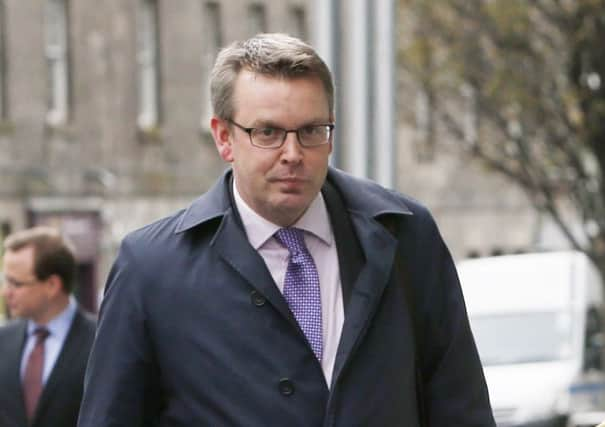Senior Holyrood figures in bid to avert Brexit '˜power-grab' crisis


Changes are expected to be made to the legislation when it moves to second chamber in the New Year, in a bid to stop Brexit triggering an unprecedented constitutional crisis that leads to another Scottish independence referendum.
Private meetings took place at Westminster this week between senior figures in the House of Lords, the Scottish Parliament and the Welsh Assembly in a bid to find common ground on amendments to Clause 11, which sets out how powers returning from the EU in devolved areas will be managed.
Advertisement
Hide AdAdvertisement
Hide AdBoth the Scottish and Welsh governments are demanding changes to Clause 11, saying proposals in legislation to hold up to 111 powers at Westminster are a ‘power grab’ and undermine the principles of devolution.
UK ministers have pledged to devolve many of those powers once the UK leaves the EU, but opposition parties have united around demands for guarantees to be set out in law.
Talks between the UK and Scottish Governments are thought to have reached broad agreement on areas where ‘common frameworks’ will be needed to jointly manage powers kept at a UK level in order to prevent different regulatory regimes creating trade barriers within the UK after Brexit.
However, in public the two sides have remained far apart on the key principle of where powers should reside after Brexit - with the Scottish Parliament, as set out in the Scotland Act, or at Westminster, as the Withdrawal Bill currently states.
Ahead of debate in the Commons at the start of December on amendments to Clause 11, peers on the Lords Constitution Committee met with Scottish Parliament Finance and Constitution Committee convener Bruce Crawford, the former Scottish Government cabinet minister, and deputy convener Adam Tomkins, the Scottish Conservative constitution spokesman.
Scotland on Sunday understands the SNP wants to “cover all our bases” and ensure there is a fall-back plan in the House of Lords if amendments to Clause 11 are not passed in the Commons.
The Scottish Conservatives and the Scotland Office also believe the bill needs to be amended to offer clearer legal guarantees of how and when new powers will come to Holyrood, and are working to convince party colleagues in the Lords and the UK Government of the need for compromise.
Mr Tomkins told Scotland on Sunday: “Like all bills, this bill will need to go through both Houses of Parliament, and like most bills that turn out to be more controversial than the government had anticipated, it’s unlikely that all of the issues that have been identified will fixed in the Commons.
Advertisement
Hide AdAdvertisement
Hide Ad“A lot of them will be addressed in the Commons, but not all of them will be fixed. Quite a lot of the heavy lifting around the devolution aspects of the Withdrawal Bill in the Lords… If you look at the various Scotland Bills, they all went through quite significant debate and amendment in the House of Lords.”
Underlining the support among Scottish Tories for the bill to be changed, Mr Tomkins added: “If you look at the evidence that David Mundell has given both to the Scottish Affairs Committee in the Commons, and to the Finance and Constitution Committee in Holyrood, you’ll see that David has said to both those committees that all 111 of these powers will either be exercised by the Scottish Parliament or will be exercised subject to a common framework to which the Scottish Government is a party. That’s his position [but] that’s not what Clause 11 says.”
Mr Crawford said: “As far as Clause 11 of the EU (Withdrawal) Bill is concerned, I am very confident that if it remains unaltered or is not removed, then there will be no majority in the Scottish Parliament to pass a legislative consent motion.
“It’s imperative therefore that the House of commons and the UK Government are listening to what Scotland is saying.
“If the UK Government doesn’t support the Scottish and Welsh government amendments, then attention will turn to the Lords to see what can be achieved there.”
The moves raise the prospect that a deal can be reached to avoid constitutional breakdown if the Scottish Parliament refuses its consent for the Withdrawal Bill.
However, it means the row over the legislation and new powers for Scotland is set to go down to the wire, with a vote on legislative consent at Holyrood only expected after the report stage in the House of Lords, scheduled for March.
Further pressure could be heaped on Joint Ministerial Committee talks between the Scottish and UK Governments in the New Year if MSPs issue a unanimous cross-party call for Clause 11 to be amended or redrafted.
Advertisement
Hide AdAdvertisement
Hide AdThe Finance and Constitution Committee at Holyrood is expected to publish a report on the Withdrawal Bill early in the New Year.
SNP MP Tommy Sheppard raised the stakes earlier this month, warning that a failure to get legislative consent from Holyrood would lead to another independence referendum.
Mr Sheppard told the Commons: “There are only two ways that this can go from here.
“One is that the United Kingdom government will come to an agreement with the Scottish Government and that the Brexit process will go through with the consent of the Scottish Parliament.
“The other option is that the UK government will ignore the representations of Scotland, overrule them and proceed regardless.
“In those latter circumstances, I tell you here today that the mandate from 2016 is still there, and it will be executed, because we will give the people of Scotland a right to decide.”
